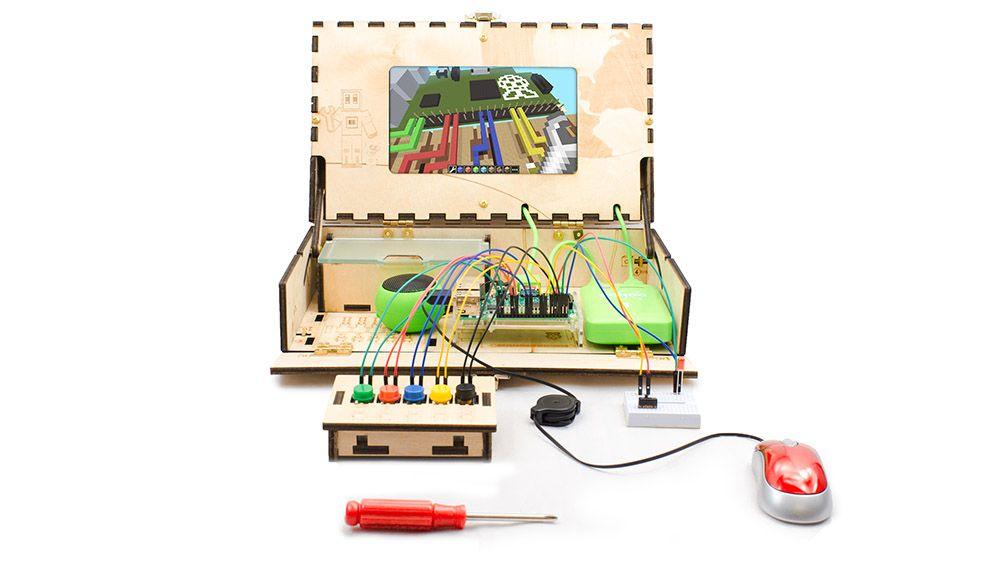$ 10 million investment and Wozniak's praise is a long way to create a computer designer for children
Interview with Mark Pavlyukovsky, the creator of the Piper training computer designer. As he moved from Ukraine to America, he almost died in Africa, he graduated from Princeton, threw his doctoral thesis at Oxford and made a product that Satya Nadella and Steve Wozniak praised.
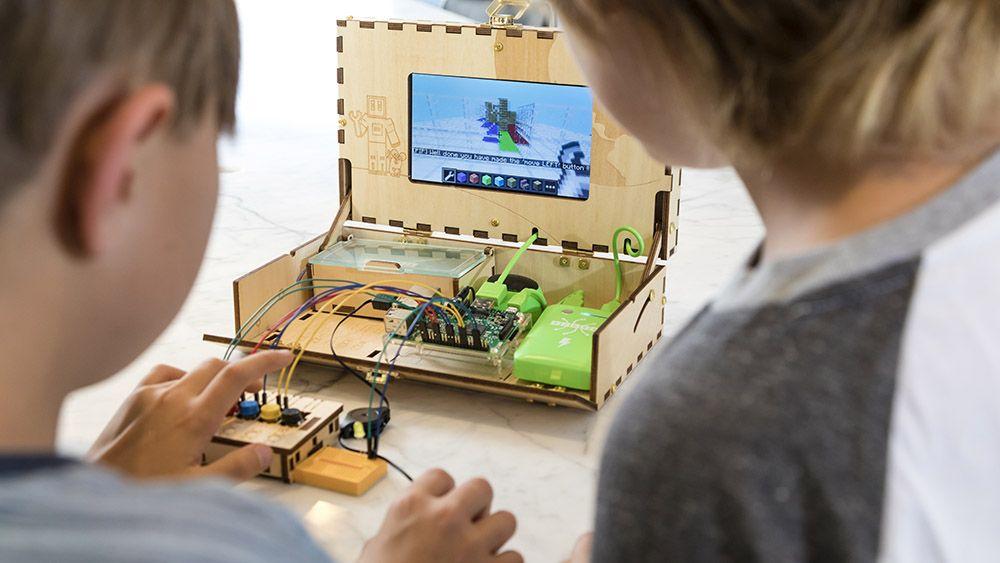
In mid-October, the venture fund Sistema_VC held a conference on Machine Teaching, where the founders of educational start-ups gathered to discuss technical progress.
Mark Pavlyukovsky, the founder of Piper, was a special guest. His company makes a designer computer, a toy that teaches children programming and engineering with the help of wires, microcircuits and Minecraft. A couple of years ago, Mark successfully completed Kickstarter with Piper, several incubators in Silicon Valley and raised about $ 11 million in investments. He is now a member of Forbes’s 30-year-old promising businessmen, and the toy is at home, for example, with Satya Nadella and Steve Wozniak.
Mark himself is a former student of Princeton and Oxford. He was born in Ukraine, moved with his mother to the USA as a child. In several interviews, Mark said that he did not consider himself outstanding - just a guy who was lucky. And the fact that no luck to others is unfair. In the third year of study, he was driven by this impulse flew to Africa, where he almost died.
Mark got to Russia for the first time in his life. It seems that in America they did not tell him that it was snowing in here, felt boots, bears and without vodka you could die from the cold. They probably thought that he himself had seen everything - why stir up children's injuries. Therefore, he was dressed completely at the weather.
I was waiting for a typical startup star from the valley — another Tony Robbins, who shines a smile like a searchlight and floods everything with energy. But Mark looked like he was carrying the weight of the whole world on his shoulders. Tired, thoughtful, with a thin look and bags under the eyes. He has a quiet voice, and he slowly picked up slightly forgotten Russian words. Perhaps jetlag, but it seemed to me, not only.
At the meeting, he brought a healthy suitcase, as if he had just got off the plane - although he flew in a day ago. Inside there was a box with a designer, which we dismantled around the table in the cafe.
On the one hand, I wanted to sort out the wires and buttons to make the controller for the computer myself. On the other hand, to understand why a young entrepreneur should leave a prestigious university, fly to Africa to save children, and generally talk about global injustice.
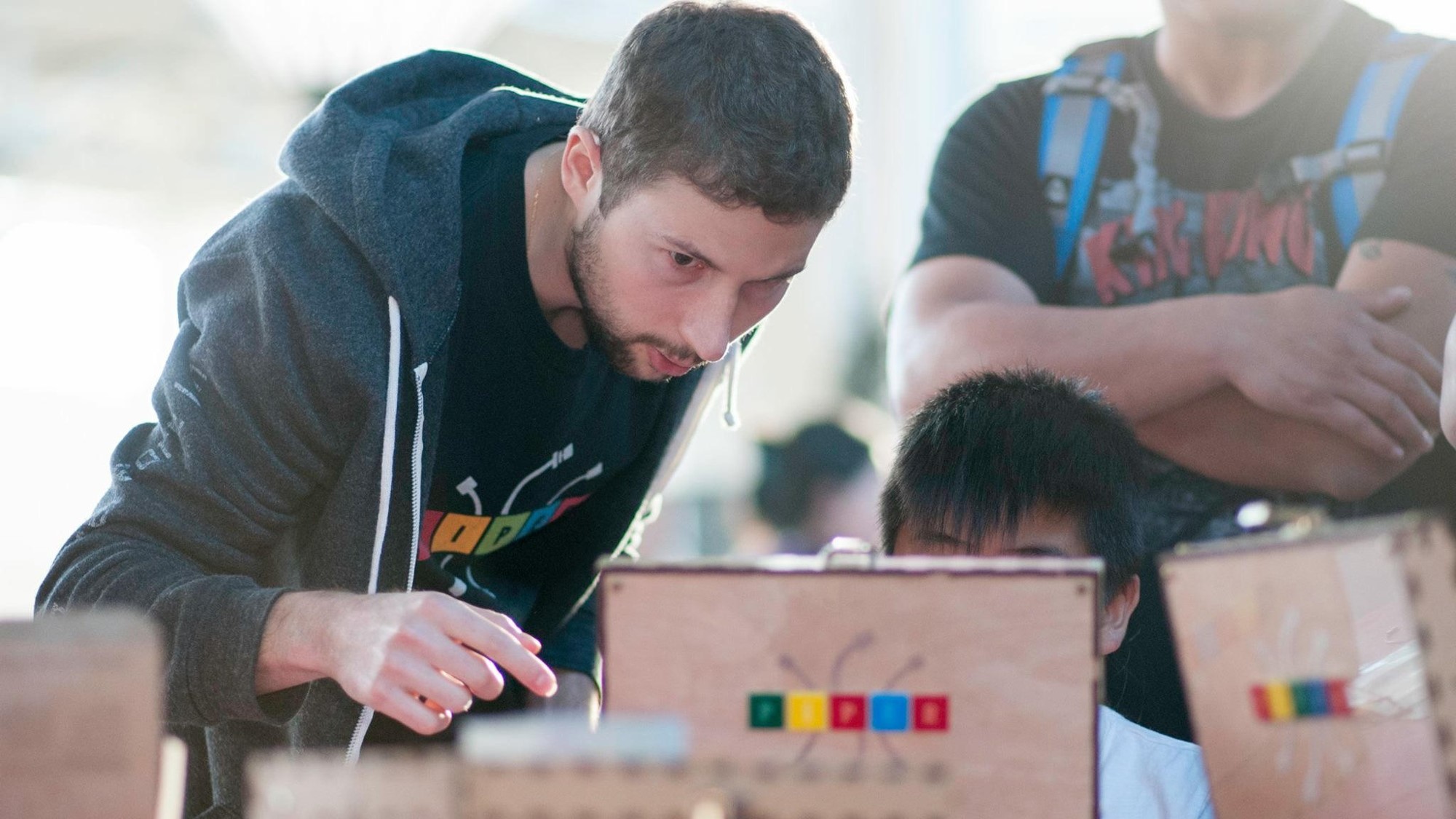
- I read that you moved from Ukraine to America at the age of nine, then came back, and then flew back to America. Why is that?
- Honestly, the first time I came there at the age of five. I spent half a year, and I didn’t like it so much that I asked my mother to come back. Then we lived in Louisiana. This is one of the poorest states - it is difficult to judge about America as a whole. It was difficult for me, I did not speak English. I was stuck in a class where all the migrants. Everyone spoke their own languages.
Maybe this is a Russian tradition, it is usually not accepted there - but when I didn’t like something, I started to fight, and I was punished all the time. So I went back. I studied in the Ukrainian school for two years, and in nine years I came to America again.
In Ukraine, everything was different, there was a shortage - we handed over bottles to get some money and go play PlayStation. There were five channels on the TV. Watch cartoons half an hour - this is already luck. And in America, all the toys dohrena. There is not enough space for them in the houses. There is a whole channel where cartoons twist day and night. I really liked it, I learned English so much - I just watched a lot of cartoons.
Up to 18, I lived in six states. My mother and I traveled a lot around America.
- Did your parents have any business?
- Mom moved to study, and I went with her. She studied on one program, then on another. It was difficult, I was just built in a rut, and left again. But he got acquainted with many people and talked. I think it helped a lot to become more open and flexible.
- I read, parents helped you with Piper. It's true?
- In fact, my mother was very much against it. She wanted me to become a doctor, to do something stable. So she was not very supportive. At first I entered a biologist, and I still feel that she is a little offended because I quit my doctoral program.
“Even when such a success happened?”
“I don’t know ... she thinks it’s somehow unstable.” It is not clear what will happen next.
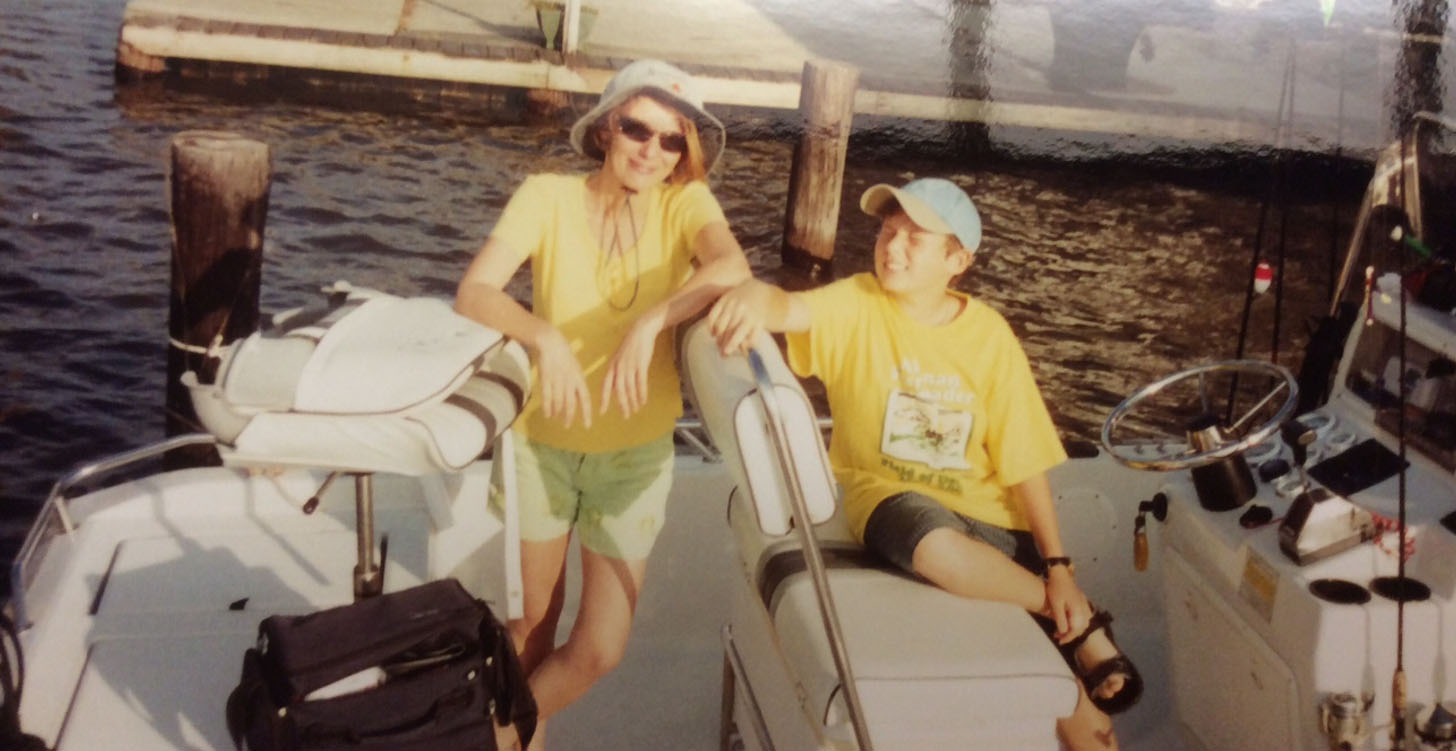 Mark with Mom
Mark with Mom
- Did you study at Princeton?
- Yes, then I went to Oxford and worked on a doctorate in computer science and machine learning in biology. We analyzed cancer images. But I quit it.
- Why?
- I realized that it is important for me to work in a team on something where I see progress. When you do a doctorate, you sit one long, long days, weeks. My professor was very famous and respected in England. He could not spend much time with us. And I did not have enough feedback and conversations.
- Damn, with whom I did not communicate - everyone dreams of fighting cancer with the help of technology. And it seemed to you not interesting.
- All these breakthroughs that people made - they seemed to me very, very small. In science, publications are important. It’s too hard to publish something completely new and big, so people do micro-steps.
For publication, it is enough just to transfer something from one sphere to another - and it will look new and breakthrough. But it will never help anyone at all.
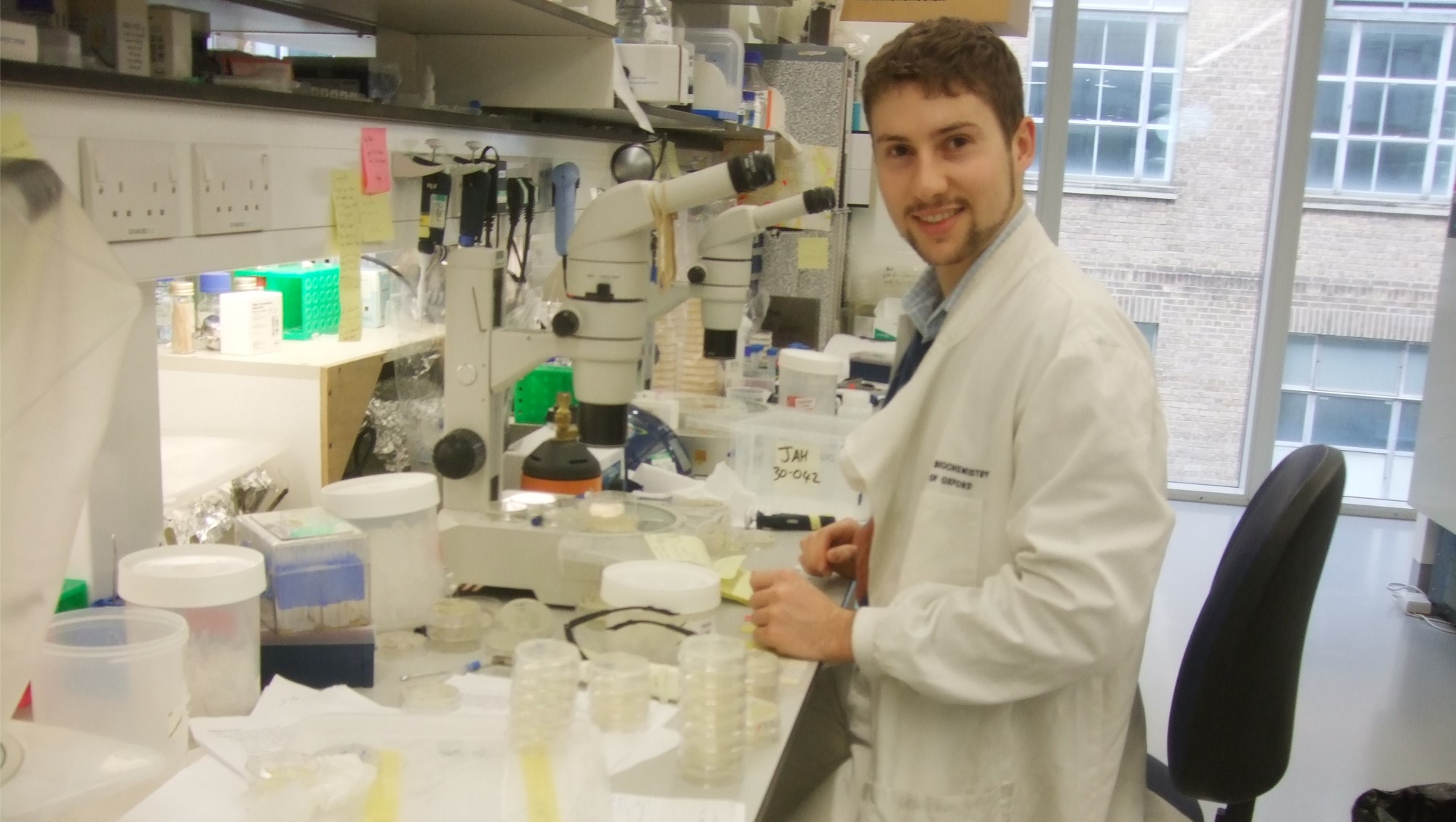
- So now you're more a businessman? Or is it an engineer?
- I do not know. But I would recommend everyone to do some kind of science - mathematics, engineering. This produces a certain way of thinking that helps in life — scientific thinking. There is a hypothesis, you are testing it, trying different things, proving or not proving. Such thinking is very important for our society. Thanks to him, it has made such progress. Such thinking helps in business too.
I do not know how I would describe myself. It seems to me more important is how people approach problem solving.
- Is it true that you were in Africa for an internship?
- Yes, it was in the third year. I wanted to do something ... more active. I felt lucky when I got to America. I had many opportunities to do different things.
I traveled back to Ukraine, saw my friends. And I did not consider myself smarter or more talented than others. Therefore, I wanted to somehow help others also use their talents. I thought - here I have knowledge of biology. How can I use it in practice?
There are many diseases in African countries. Even diarrhea can kill a person. But all these diseases are very easily prevented. I did not understand why they exist, and I thought that I could somehow help with my knowledge. Plus, with new approaches through games, I’ll bring this to the children who are getting sick, improve their lives. And he created a training program based on games, and came with her to Ghana.
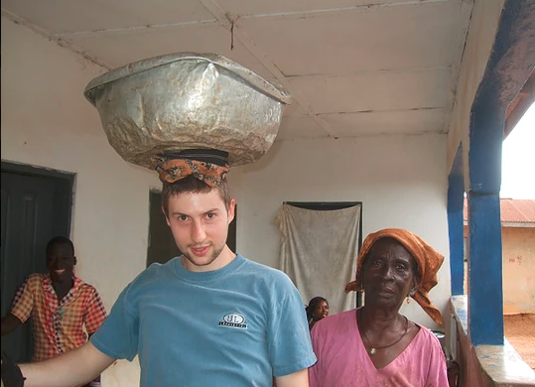
- Why did you choose Africa? There was no desire to return to Ukraine and do something there?
- It seemed to me more difficult. Problems in Ukraine are connected with powers that are not clear to me. They are more at the political level. And in Africa there was a simple decision - do not do it and you will not be ill. At that time it seemed to me that it was easier to understand and easier to solve.
- What exactly did you do there?
- I had a hypothesis that children get sick simply because they do not know how to prevent diseases. If you give knowledge in an interesting game form, then they will be better remembered, and there will be fewer diseases.
Knowledge is very simple - to maintain hygiene, wash hands, protect from mosquitoes. After all, they cook food there without having washed any food or hands, and they eat ready meals with unwashed hands.
It turned out that everything was not quite so. The causes of diseases are more extensive. People were sick not because they had no information - in fact, they all know better than anyone. They just have no infrastructure. Hands no place to wash.
In the end, I myself fell ill. I was taken away from there in serious condition. My hypothesis was wrong. Then I understood a little more about the world.
- What exactly?
- I realized that traveling somewhere is not the most efficient way. Therefore, I decided to learn how to program in order to build something capable of influencing thousands, hundreds of thousands, or even millions of people.
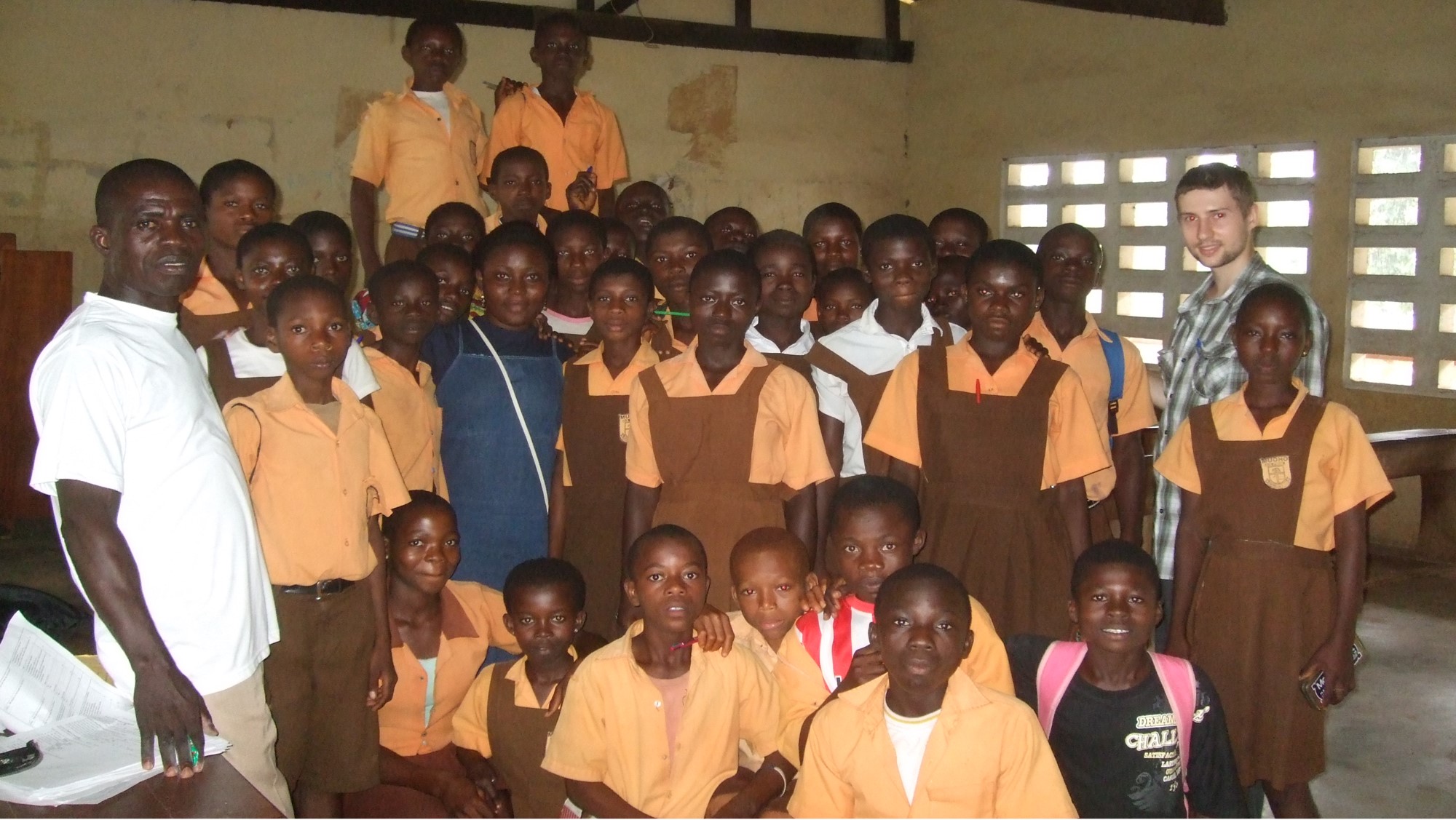
- That is, you wanted not to teach people - but to do it yourself?
- No, learn too. Just the method itself should be more ambitious.
I started taking Java programming courses. At the same time, I wanted to make a website for Princeton - a platform for students where they could debate with professors. There are a lot of interesting professors in Princeton - Nobel laureates, authors, very cool people. But it happens that there is no time to attend all the interesting lectures, and most students do not overlap with them.
Therefore, there was an idea to make a platform where all professors ask questions, students answer them, start debates. Top 10 participants, for example, would go to dinner with professors to debate live.
I did it, launched it, and we had six debates.
“But this is no longer a technological issue.” The hardest of all to organize and believe that it will be interesting to someone.
Yes of course. To persuade professors was the most difficult.
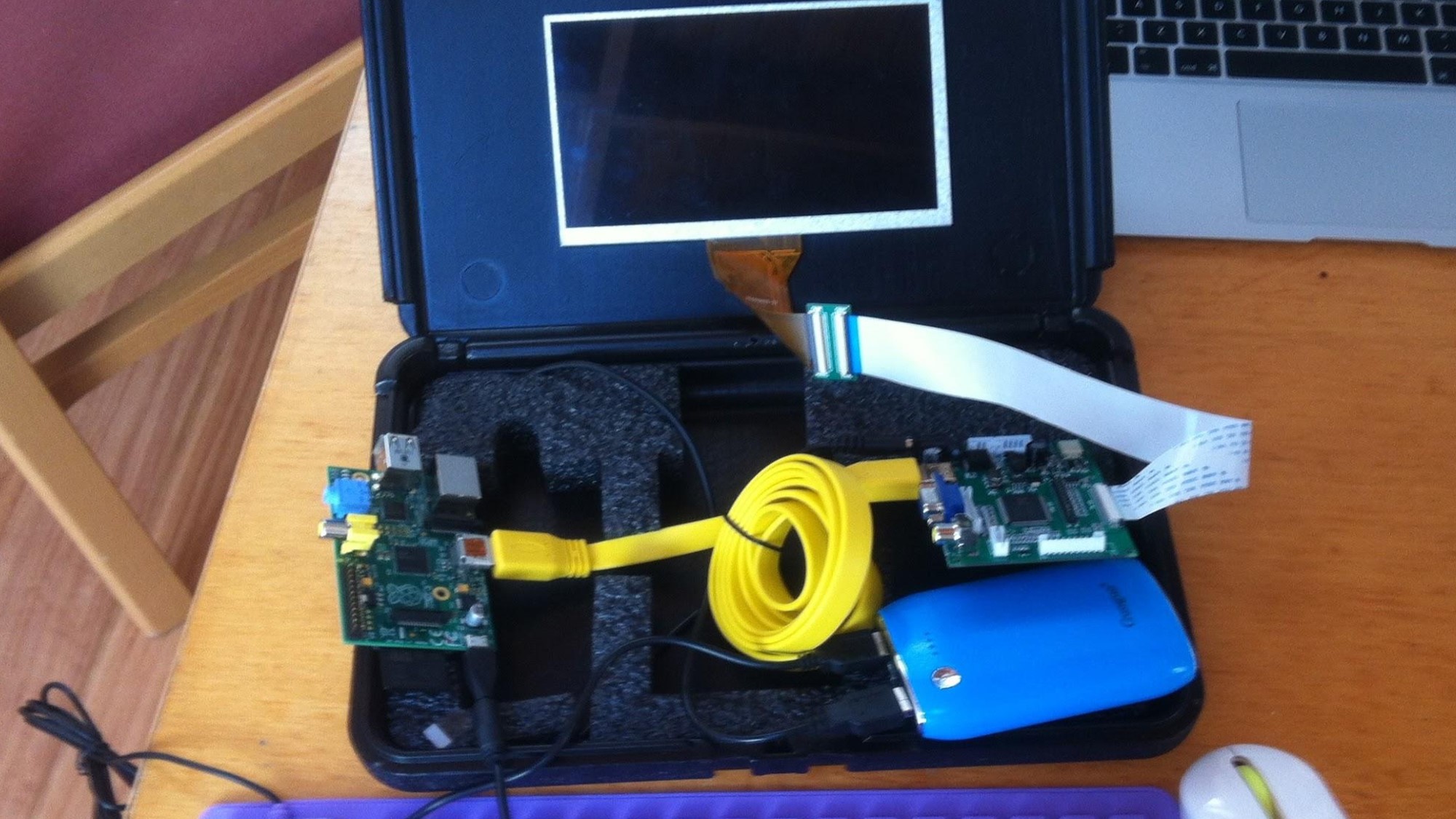 Early version of Piper
Early version of Piper
- Officially, we started the company in 2014. Before that, I worked on it for another year, but formally it has been in existence for four years.
When I started learning programming, I learned about the Raspberry Pi. This is such a $ 25 credit card size charge. I have the smallest version on my keys. Do you know how much it costs? Five dollars! You can connect to it a monitor, power, keyboard - and at the same time wear it as a key chain. It seemed to me that if I had such a cheap, cool thing in childhood, I would play with her more than with Lego.
Then we wanted to make a computer that you assemble yourself and then learn to program after it. In the beginning, we simply copied software from training sites - CodeAcademy, for example. In the first project, we trained HTML / CSS.
There were instructions on the computer, and the children wrote code on them. But they were not very interested. Everyone said, "we want to play Minecraft." We thought: “Maybe we will make Minecraft in the browser?” You play as a little man, you can go to any web page and destroy it. You go, for example, to Wikipedia, you can dig text there, dig pictures, dig links.
It was fun, but the children still didn’t like it very much. We did not understand why. Thought maybe they should be taught programming in a different way?
They will collect iron themselves, using the game as instruction. We tried to do it with the help of Minecraft, and the children liked it most.
- When did you start using Minecraft, did it already belong to Microsoft?
“I don’t remember exactly when they bought it - before or after we launched the project on Kickstarter.” But at first they did not understand how and what we use, they began to write to us. And we had a free version of Minecraft, which was released specifically for the Raspberry Pi - everyone could use it. We had to explain this to Microsoft. Of course, they do not really like it.
In principle, we have a good relationship. Satia Nadella even has a Piper. We did not communicate with him personally, but he wrote me a letter, said thank you. He introduced us to people in the company, and since then we communicate with them. Everyone is trying to agree on cooperation, but could not.
Therefore, we continue to think about how to make your Minecraft and not to depend on Microsoft. Create a platform so that in a 3D environment children can receive instructions.
- So you have no contracts and no agreements?
- For how we use the product, we do not need a contract.
- How did Piper get to Steve Wozniak?
- Steve Wozniak just saw us on Kickstarter and wrote that he really liked the product. I recently invited him to the conference, and there we met in person. He has a very cool speech. It is easy to disassemble it into quotes: every second phrase is a quote. He said that "Piper is the best child's toy if you want a child to become an inventor."
At the meeting with Wozniak, Mark was obviously more fun than with me. What am I doing wrong?
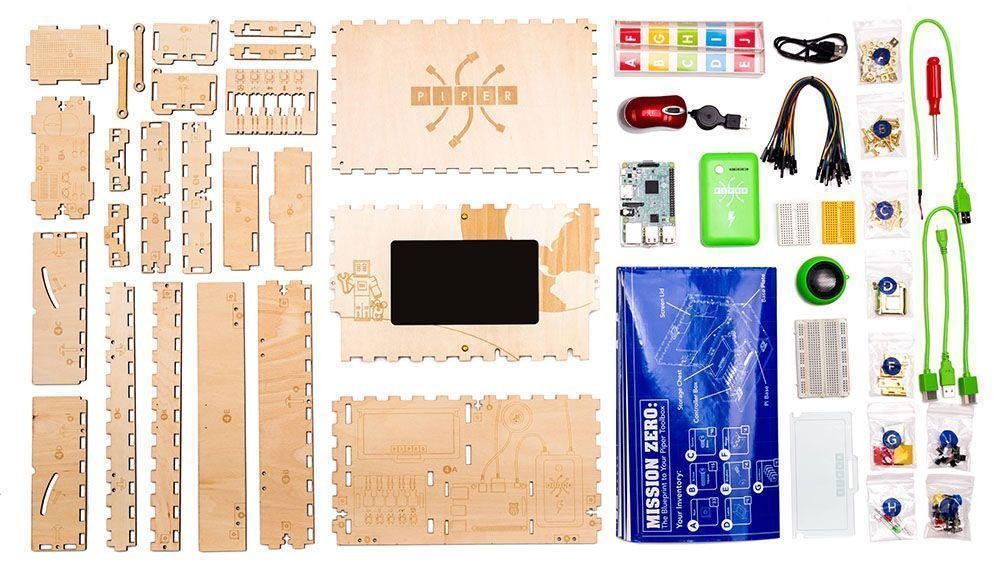
- We use Raspbian - this is the standard system for the Raspberry Pi. There we change nothing. We have a free version of Minecraft, it has an API, and we sew our code there, we make the game interactive, we add missions and goals. We have five programmers. One of them is also a game designer.
Depend on "Minecraft" is not very stable. With it you can not grow on other platforms - tablets, smartphones, computers. Therefore, we are writing our own visual platform.
For growth, the code must be controlled completely, so we took the open source Irrlicht Engine, on which the Minecraft clone Minetest was written, also open source. But it is written in half, there is not much there yet. But there are a lot of mods and extensions, so we are not doing everything from scratch.
The Minecraft firmware for Raspberry is made in Python, so we write all things related to Minecraft on Python. Maintest codebase in C ++. The programming part is written in JavaScript.
Now we are rewriting our game in Lua, doing multiplayer - on our server there will be a world visually indistinguishable from Minecraft, where other players will be able to walk, build and destroy together.
The most difficult thing is to stitch everything into one and do it on a computer where something is constantly missing. There are no good development tools for Raspberry Pi. Game designers are used to working in Unity or Unreal - they are not interested.
We have a non-standard stack for game development, so we want to move away from Minecraft and control the entire code ourselves. For example, the programming part is done in JavaScript in a standard browser.
- I talked with the guys who travel through the Russian outback and teach children programming . They had several programs - including Minecraft programming. But they refused it because it didn’t give children freedom of expression - it’s just picking up ready-made cubes. They stopped at the layout, because with her the child can make their own website and tell their story.
We did the same experiment, and we did the opposite. Maybe they looked at a different age category? Third-graders and fourth-graders do not understand why they make their site.
- You wrote something, and you got a picture.
- The same can be done with a pencil. Perhaps they are more interested in playing the game with friends. Much comes from the need to communicate with peers. For example, peers collect some cards, play video games, correspond with Snapchat and Instagram, and so on. Peer classes are the most important motivator of what children want to do.
If the children are older, they go to websites, and this is relevant for them. When you use applications, websites, you see how they work and why they are needed - and you also want to make your own. And if you love Minecraft and generally play games, then you just want to continue to do it. Motivation in children is always changing, and it is necessary that it helps them learn.
- What if there is more entertainment in Minecraft than studying?
- It depends on how you define the word "learn". When you play a new game, you learn something, anyway. The question is, do you need this information? For example, how to shoot Halo.
Some games have negative side effects, or they teach skills that are irrelevant in the real world. But it seems to me that it is very difficult to get someone to do what he does not want.
You can make Minecraft training, and you can even make bad, where you just kill and destroy. Minecraft itself is not good and not bad.
- How did you find the balance of difficulty?
It seems to us that everything is already simple. We could further simplify, for example, the assembly of a computer. There are examples of other toys, where you just collected three things, and everything is ready. It seemed to us that it was not necessary to simplify to such an extent. But we are still looking for a balance, where 80-90% of children will be able to assemble a computer.
- Seven-year-old child really collect it?
If he is motivated, he really likes Minecraft and wants to build a computer - that’s sure.
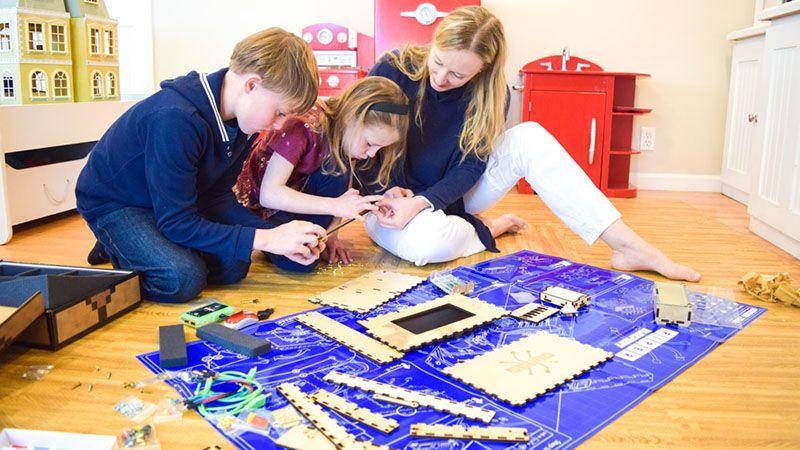
- What other skepticism have you met?
- With everything that can only be. For example, very technically oriented parents want even more technical things. That there was more programming, so that everything was even more difficult, exams and stuff.
But in general, I have not yet met anyone who would say that the product itself is not needed or that it is bad. Skepticism is usually among investors. What about iron, our business model, and so on.
- Does Kickstarter really raise the necessary money or is it just a tool for promotion?
- I think we were very lucky with Kickstarter. Now it has become very difficult. Kickstarter is just a platform on which you sell. Between him and your website there can be a difference of 15–20%. Perhaps, at Kickstarter, people buy a little more simply because they trust him, love this brand, or want to think about themselves as people who support someone’s projects. .
But most of the work you have to do yourself - pour traffic, engage in PR. Because of this, most people use Kickstarter for marketing - as a presales tool.
And it seems to me that the initial intention of Kickstarter was that you have an idea, but no capital. And good people arise, give you money and pray that you will crank up everything, and they will receive the product.
This can happen if you are lucky, someone writes about you, or if your product just hits you for a certain need.
Once I myself supported the project - Gameboy on Raspberry Pi. The creator recorded a cool video that played on nostalgia, promoted the idea that all games with Sega and Gameboy will be in your pocket. He collected a quarter of a million without marketing expenses. In the end, I received my product, but it did not work.
60-70% of projects at Kikstarter - even if they collect money - cannot complete the job, because there is no expertise on how to produce a product, how to send it. We were lucky that we were in San Francisco, and we had mentors and investors who helped and hinted at things like bulk mailing.
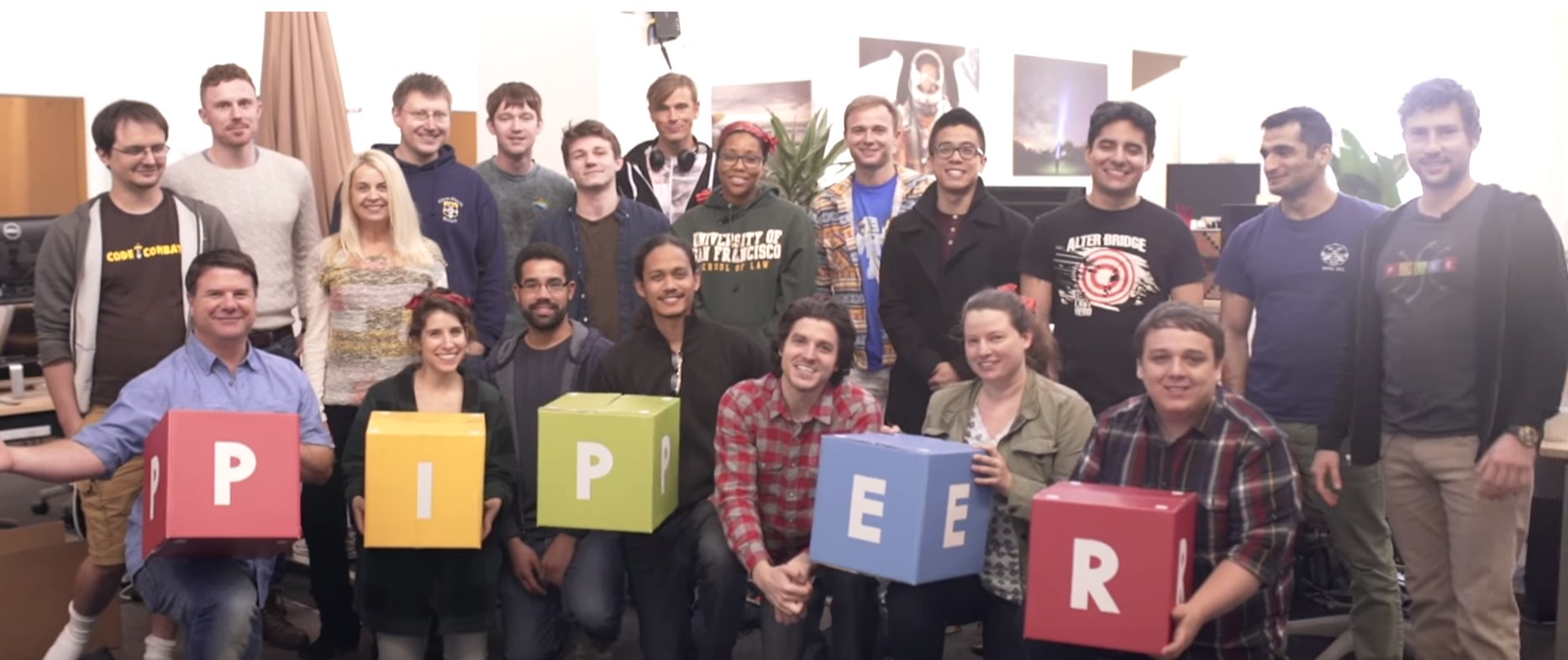
- You said: "It is unfair that opportunities are not evenly distributed among people." Don't you think that pushing everyone towards engineering only feeds injustice?
Not everyone is happy to be programmers, but everyone seems to be forced to be, because IT has more money and opportunities. For example, a child would be happy to be an ice cream seller, but in reality he has almost no chance of success and happiness with this.
- We do not say that programming is the only interesting profession. We don’t care if he becomes a programmer or a journalist. If it were important for us to train professionals, we would test, track progress, take exams, and test skills.
It is more important for us that the child feel confident. So that he understands that he can achieve everything he wants - he had already built a computer at an early age.
It seems to us that all the people who have achieved something - both programmers and everyone else - they had early impressions that inspired or gave them the hope that they are able to achieve great things.
We just want to give this impression to everyone. It is important for us that children understand how technology works. It is as important as understanding the story, where you came from, why the world is what it is. Just to be a more developed person.
But this does not mean that everyone should become historians. Simply programming is a subject that is not taught everywhere, but it is needed everywhere.
- Is this the injustice? Programming is needed everywhere, but not everyone wants to do it. And if someone refuses - as if depriving themselves of the future.
- You know, probably, injustice is not what we teach, but that not everyone has the opportunity to learn. If everyone could put together a computer and feel confident, no one would oppose it. The injustice is that for us and for the buyers it costs something, and because of the prices it is not accessible to everyone.
Education is received only by those who can buy it - this is injustice.
“You've been to a lot, have seen a lot.” Is it possible to fix the world so that it is not what it is now?
- I don’t really know if it’s possible or impossible. But it seems to me, we must believe that it is possible. If you believe - you will spend on this force, you will strive. When you think that this will inevitably happen, it is much more likely that this will happen.
There are two trends, and they, I think, contradict each other. The first is that we must go into technology, control and understand everything. The second - on the contrary, we must simplify everything so that everything itself is collected and done without the use of code.
I think we - humanity - has an instinct to invent, improve, move progress. The ideal result of everything in an ideal world - you just took it into your head, and it already exists. But before we reach the ideal world, something bad can happen. We will all get stuck in iPhones or artificial intelligence will take over the world.
It seems to me that conflict and dissonance arise when people think “I don’t want to do anything, I want everyone to do it myself” and at the same time are afraid to come to a bad situation. For example, Ilon Mask is trying to make cars on autopilot, but on the other hand, he is very afraid of artificial intelligence and is funding an initiative that will make AI open-source so that no one can use it for selfish purposes.
Martin Luther King said: “History does not necessarily go in the right direction. There must be people who direct it. ” The world itself will not come to the ideal. Most likely the opposite - he will come to a bad place. Therefore, we need people to understand, think and try to invent.
“If you were immortal, what would you do?”
- I would go to North Korea. Probably, I would no longer feel the pressure of the deadline. I would not be so tense, I felt relaxed. But he would do more radical things.

In mid-October, the venture fund Sistema_VC held a conference on Machine Teaching, where the founders of educational start-ups gathered to discuss technical progress.
Mark Pavlyukovsky, the founder of Piper, was a special guest. His company makes a designer computer, a toy that teaches children programming and engineering with the help of wires, microcircuits and Minecraft. A couple of years ago, Mark successfully completed Kickstarter with Piper, several incubators in Silicon Valley and raised about $ 11 million in investments. He is now a member of Forbes’s 30-year-old promising businessmen, and the toy is at home, for example, with Satya Nadella and Steve Wozniak.
Mark himself is a former student of Princeton and Oxford. He was born in Ukraine, moved with his mother to the USA as a child. In several interviews, Mark said that he did not consider himself outstanding - just a guy who was lucky. And the fact that no luck to others is unfair. In the third year of study, he was driven by this impulse flew to Africa, where he almost died.
Mark got to Russia for the first time in his life. It seems that in America they did not tell him that it was snowing in here, felt boots, bears and without vodka you could die from the cold. They probably thought that he himself had seen everything - why stir up children's injuries. Therefore, he was dressed completely at the weather.
I was waiting for a typical startup star from the valley — another Tony Robbins, who shines a smile like a searchlight and floods everything with energy. But Mark looked like he was carrying the weight of the whole world on his shoulders. Tired, thoughtful, with a thin look and bags under the eyes. He has a quiet voice, and he slowly picked up slightly forgotten Russian words. Perhaps jetlag, but it seemed to me, not only.
At the meeting, he brought a healthy suitcase, as if he had just got off the plane - although he flew in a day ago. Inside there was a box with a designer, which we dismantled around the table in the cafe.
On the one hand, I wanted to sort out the wires and buttons to make the controller for the computer myself. On the other hand, to understand why a young entrepreneur should leave a prestigious university, fly to Africa to save children, and generally talk about global injustice.

Migration, Africa, Princeton
- I read that you moved from Ukraine to America at the age of nine, then came back, and then flew back to America. Why is that?
- Honestly, the first time I came there at the age of five. I spent half a year, and I didn’t like it so much that I asked my mother to come back. Then we lived in Louisiana. This is one of the poorest states - it is difficult to judge about America as a whole. It was difficult for me, I did not speak English. I was stuck in a class where all the migrants. Everyone spoke their own languages.
Maybe this is a Russian tradition, it is usually not accepted there - but when I didn’t like something, I started to fight, and I was punished all the time. So I went back. I studied in the Ukrainian school for two years, and in nine years I came to America again.
In Ukraine, everything was different, there was a shortage - we handed over bottles to get some money and go play PlayStation. There were five channels on the TV. Watch cartoons half an hour - this is already luck. And in America, all the toys dohrena. There is not enough space for them in the houses. There is a whole channel where cartoons twist day and night. I really liked it, I learned English so much - I just watched a lot of cartoons.
Up to 18, I lived in six states. My mother and I traveled a lot around America.
- Did your parents have any business?
- Mom moved to study, and I went with her. She studied on one program, then on another. It was difficult, I was just built in a rut, and left again. But he got acquainted with many people and talked. I think it helped a lot to become more open and flexible.
- I read, parents helped you with Piper. It's true?
- In fact, my mother was very much against it. She wanted me to become a doctor, to do something stable. So she was not very supportive. At first I entered a biologist, and I still feel that she is a little offended because I quit my doctoral program.
“Even when such a success happened?”
“I don’t know ... she thinks it’s somehow unstable.” It is not clear what will happen next.
 Mark with Mom
Mark with Mom- Did you study at Princeton?
- Yes, then I went to Oxford and worked on a doctorate in computer science and machine learning in biology. We analyzed cancer images. But I quit it.
- Why?
- I realized that it is important for me to work in a team on something where I see progress. When you do a doctorate, you sit one long, long days, weeks. My professor was very famous and respected in England. He could not spend much time with us. And I did not have enough feedback and conversations.
- Damn, with whom I did not communicate - everyone dreams of fighting cancer with the help of technology. And it seemed to you not interesting.
- All these breakthroughs that people made - they seemed to me very, very small. In science, publications are important. It’s too hard to publish something completely new and big, so people do micro-steps.
For publication, it is enough just to transfer something from one sphere to another - and it will look new and breakthrough. But it will never help anyone at all.

- So now you're more a businessman? Or is it an engineer?
- I do not know. But I would recommend everyone to do some kind of science - mathematics, engineering. This produces a certain way of thinking that helps in life — scientific thinking. There is a hypothesis, you are testing it, trying different things, proving or not proving. Such thinking is very important for our society. Thanks to him, it has made such progress. Such thinking helps in business too.
I do not know how I would describe myself. It seems to me more important is how people approach problem solving.
- Is it true that you were in Africa for an internship?
- Yes, it was in the third year. I wanted to do something ... more active. I felt lucky when I got to America. I had many opportunities to do different things.
I traveled back to Ukraine, saw my friends. And I did not consider myself smarter or more talented than others. Therefore, I wanted to somehow help others also use their talents. I thought - here I have knowledge of biology. How can I use it in practice?
There are many diseases in African countries. Even diarrhea can kill a person. But all these diseases are very easily prevented. I did not understand why they exist, and I thought that I could somehow help with my knowledge. Plus, with new approaches through games, I’ll bring this to the children who are getting sick, improve their lives. And he created a training program based on games, and came with her to Ghana.

- Why did you choose Africa? There was no desire to return to Ukraine and do something there?
- It seemed to me more difficult. Problems in Ukraine are connected with powers that are not clear to me. They are more at the political level. And in Africa there was a simple decision - do not do it and you will not be ill. At that time it seemed to me that it was easier to understand and easier to solve.
- What exactly did you do there?
- I had a hypothesis that children get sick simply because they do not know how to prevent diseases. If you give knowledge in an interesting game form, then they will be better remembered, and there will be fewer diseases.
Knowledge is very simple - to maintain hygiene, wash hands, protect from mosquitoes. After all, they cook food there without having washed any food or hands, and they eat ready meals with unwashed hands.
It turned out that everything was not quite so. The causes of diseases are more extensive. People were sick not because they had no information - in fact, they all know better than anyone. They just have no infrastructure. Hands no place to wash.
In the end, I myself fell ill. I was taken away from there in serious condition. My hypothesis was wrong. Then I understood a little more about the world.
- What exactly?
- I realized that traveling somewhere is not the most efficient way. Therefore, I decided to learn how to program in order to build something capable of influencing thousands, hundreds of thousands, or even millions of people.

- That is, you wanted not to teach people - but to do it yourself?
- No, learn too. Just the method itself should be more ambitious.
I started taking Java programming courses. At the same time, I wanted to make a website for Princeton - a platform for students where they could debate with professors. There are a lot of interesting professors in Princeton - Nobel laureates, authors, very cool people. But it happens that there is no time to attend all the interesting lectures, and most students do not overlap with them.
Therefore, there was an idea to make a platform where all professors ask questions, students answer them, start debates. Top 10 participants, for example, would go to dinner with professors to debate live.
I did it, launched it, and we had six debates.
“But this is no longer a technological issue.” The hardest of all to organize and believe that it will be interesting to someone.
Yes of course. To persuade professors was the most difficult.
How did Piper start
 Early version of Piper
Early version of Piper- Officially, we started the company in 2014. Before that, I worked on it for another year, but formally it has been in existence for four years.
When I started learning programming, I learned about the Raspberry Pi. This is such a $ 25 credit card size charge. I have the smallest version on my keys. Do you know how much it costs? Five dollars! You can connect to it a monitor, power, keyboard - and at the same time wear it as a key chain. It seemed to me that if I had such a cheap, cool thing in childhood, I would play with her more than with Lego.
Then we wanted to make a computer that you assemble yourself and then learn to program after it. In the beginning, we simply copied software from training sites - CodeAcademy, for example. In the first project, we trained HTML / CSS.
There were instructions on the computer, and the children wrote code on them. But they were not very interested. Everyone said, "we want to play Minecraft." We thought: “Maybe we will make Minecraft in the browser?” You play as a little man, you can go to any web page and destroy it. You go, for example, to Wikipedia, you can dig text there, dig pictures, dig links.
It was fun, but the children still didn’t like it very much. We did not understand why. Thought maybe they should be taught programming in a different way?
They will collect iron themselves, using the game as instruction. We tried to do it with the help of Minecraft, and the children liked it most.
- When did you start using Minecraft, did it already belong to Microsoft?
“I don’t remember exactly when they bought it - before or after we launched the project on Kickstarter.” But at first they did not understand how and what we use, they began to write to us. And we had a free version of Minecraft, which was released specifically for the Raspberry Pi - everyone could use it. We had to explain this to Microsoft. Of course, they do not really like it.
In principle, we have a good relationship. Satia Nadella even has a Piper. We did not communicate with him personally, but he wrote me a letter, said thank you. He introduced us to people in the company, and since then we communicate with them. Everyone is trying to agree on cooperation, but could not.
Therefore, we continue to think about how to make your Minecraft and not to depend on Microsoft. Create a platform so that in a 3D environment children can receive instructions.
- So you have no contracts and no agreements?
- For how we use the product, we do not need a contract.
- How did Piper get to Steve Wozniak?
- Steve Wozniak just saw us on Kickstarter and wrote that he really liked the product. I recently invited him to the conference, and there we met in person. He has a very cool speech. It is easy to disassemble it into quotes: every second phrase is a quote. He said that "Piper is the best child's toy if you want a child to become an inventor."
At the meeting with Wozniak, Mark was obviously more fun than with me. What am I doing wrong?
How to collect Piper, how to play, and what to learn there
When Mark got the computer out of the package, she had an optical illusion on her sides - from the movement of the paper. It seemed that the gears were spinning inside. He says pleasant things should be from the beginning. Out of the box, he pulled the folded instructions. It resembled a classic engineering drawing on blue paper, and in its expanded form it was not to clasp it with outstretched arms. At first glance, you do not believe that a seven-year-old child is capable of understanding something there. But Mark says: “It only seems like an adult.”
The computer case is a wooden box that you also collect yourself. The monitor is inserted into the top cover, the Raspberry Pi board, the power supply and many other small things that will be used after the launch are inserted into the bottom one.
We started the computer. A menu appears on the screen where Mark turned on Story Mode. A video was launched on how a meteorite flies to Earth, and only a robot on Mars can stop it. For him and have to play.
To take control of the robot, you need to find where to connect the mouse. This is easy, but apart from the review nothing can be done. In order for the robot to go, it is necessary to assemble the controller - and here the interesting began.
An instruction appeared on the screen. I was asked to take two wires and plug them into the board. If you close the free ends of the wires - the robot will go. I am 29 years old, but when I did it, and the robot on the screen really went - I was high as a child.
It is natural to close the wires constantly uncomfortable. Therefore, I also, according to the instructions, inserted wires into another free card and secured a button next to them. Now the robot went on pressing it, and this was only the first step towards creating a full-fledged controller.
To complete the game, you have to constantly poke something, collect - controllers, LEDs, boards. In addition to "Minecraft" there is a separate mode, where everything collected can be programmed in its own way. It looks like a constructor from ready-made lines of code and commands. For example, you collect the LED, expose the command by which it lights up, hang the repetition from the top, expose the parameters - and the LED starts flashing.
In general, everyone who was at this conference - sorry. We were late for playing in Piper.
Technology inside Piper

- We use Raspbian - this is the standard system for the Raspberry Pi. There we change nothing. We have a free version of Minecraft, it has an API, and we sew our code there, we make the game interactive, we add missions and goals. We have five programmers. One of them is also a game designer.
Depend on "Minecraft" is not very stable. With it you can not grow on other platforms - tablets, smartphones, computers. Therefore, we are writing our own visual platform.
For growth, the code must be controlled completely, so we took the open source Irrlicht Engine, on which the Minecraft clone Minetest was written, also open source. But it is written in half, there is not much there yet. But there are a lot of mods and extensions, so we are not doing everything from scratch.
The Minecraft firmware for Raspberry is made in Python, so we write all things related to Minecraft on Python. Maintest codebase in C ++. The programming part is written in JavaScript.
Now we are rewriting our game in Lua, doing multiplayer - on our server there will be a world visually indistinguishable from Minecraft, where other players will be able to walk, build and destroy together.
The most difficult thing is to stitch everything into one and do it on a computer where something is constantly missing. There are no good development tools for Raspberry Pi. Game designers are used to working in Unity or Unreal - they are not interested.
We have a non-standard stack for game development, so we want to move away from Minecraft and control the entire code ourselves. For example, the programming part is done in JavaScript in a standard browser.
Skepticism
- I talked with the guys who travel through the Russian outback and teach children programming . They had several programs - including Minecraft programming. But they refused it because it didn’t give children freedom of expression - it’s just picking up ready-made cubes. They stopped at the layout, because with her the child can make their own website and tell their story.
We did the same experiment, and we did the opposite. Maybe they looked at a different age category? Third-graders and fourth-graders do not understand why they make their site.
- You wrote something, and you got a picture.
- The same can be done with a pencil. Perhaps they are more interested in playing the game with friends. Much comes from the need to communicate with peers. For example, peers collect some cards, play video games, correspond with Snapchat and Instagram, and so on. Peer classes are the most important motivator of what children want to do.
If the children are older, they go to websites, and this is relevant for them. When you use applications, websites, you see how they work and why they are needed - and you also want to make your own. And if you love Minecraft and generally play games, then you just want to continue to do it. Motivation in children is always changing, and it is necessary that it helps them learn.
- What if there is more entertainment in Minecraft than studying?
- It depends on how you define the word "learn". When you play a new game, you learn something, anyway. The question is, do you need this information? For example, how to shoot Halo.
Some games have negative side effects, or they teach skills that are irrelevant in the real world. But it seems to me that it is very difficult to get someone to do what he does not want.
You can make Minecraft training, and you can even make bad, where you just kill and destroy. Minecraft itself is not good and not bad.
- How did you find the balance of difficulty?
It seems to us that everything is already simple. We could further simplify, for example, the assembly of a computer. There are examples of other toys, where you just collected three things, and everything is ready. It seemed to us that it was not necessary to simplify to such an extent. But we are still looking for a balance, where 80-90% of children will be able to assemble a computer.
- Seven-year-old child really collect it?
If he is motivated, he really likes Minecraft and wants to build a computer - that’s sure.

- What other skepticism have you met?
- With everything that can only be. For example, very technically oriented parents want even more technical things. That there was more programming, so that everything was even more difficult, exams and stuff.
But in general, I have not yet met anyone who would say that the product itself is not needed or that it is bad. Skepticism is usually among investors. What about iron, our business model, and so on.
Kickstarter Promotion
- Does Kickstarter really raise the necessary money or is it just a tool for promotion?
- I think we were very lucky with Kickstarter. Now it has become very difficult. Kickstarter is just a platform on which you sell. Between him and your website there can be a difference of 15–20%. Perhaps, at Kickstarter, people buy a little more simply because they trust him, love this brand, or want to think about themselves as people who support someone’s projects. .
But most of the work you have to do yourself - pour traffic, engage in PR. Because of this, most people use Kickstarter for marketing - as a presales tool.
And it seems to me that the initial intention of Kickstarter was that you have an idea, but no capital. And good people arise, give you money and pray that you will crank up everything, and they will receive the product.
This can happen if you are lucky, someone writes about you, or if your product just hits you for a certain need.
Once I myself supported the project - Gameboy on Raspberry Pi. The creator recorded a cool video that played on nostalgia, promoted the idea that all games with Sega and Gameboy will be in your pocket. He collected a quarter of a million without marketing expenses. In the end, I received my product, but it did not work.
60-70% of projects at Kikstarter - even if they collect money - cannot complete the job, because there is no expertise on how to produce a product, how to send it. We were lucky that we were in San Francisco, and we had mentors and investors who helped and hinted at things like bulk mailing.

Injustice and the meaning of learning
- You said: "It is unfair that opportunities are not evenly distributed among people." Don't you think that pushing everyone towards engineering only feeds injustice?
Not everyone is happy to be programmers, but everyone seems to be forced to be, because IT has more money and opportunities. For example, a child would be happy to be an ice cream seller, but in reality he has almost no chance of success and happiness with this.
- We do not say that programming is the only interesting profession. We don’t care if he becomes a programmer or a journalist. If it were important for us to train professionals, we would test, track progress, take exams, and test skills.
It is more important for us that the child feel confident. So that he understands that he can achieve everything he wants - he had already built a computer at an early age.
It seems to us that all the people who have achieved something - both programmers and everyone else - they had early impressions that inspired or gave them the hope that they are able to achieve great things.
We just want to give this impression to everyone. It is important for us that children understand how technology works. It is as important as understanding the story, where you came from, why the world is what it is. Just to be a more developed person.
But this does not mean that everyone should become historians. Simply programming is a subject that is not taught everywhere, but it is needed everywhere.
- Is this the injustice? Programming is needed everywhere, but not everyone wants to do it. And if someone refuses - as if depriving themselves of the future.
- You know, probably, injustice is not what we teach, but that not everyone has the opportunity to learn. If everyone could put together a computer and feel confident, no one would oppose it. The injustice is that for us and for the buyers it costs something, and because of the prices it is not accessible to everyone.
Education is received only by those who can buy it - this is injustice.
“You've been to a lot, have seen a lot.” Is it possible to fix the world so that it is not what it is now?
- I don’t really know if it’s possible or impossible. But it seems to me, we must believe that it is possible. If you believe - you will spend on this force, you will strive. When you think that this will inevitably happen, it is much more likely that this will happen.
There are two trends, and they, I think, contradict each other. The first is that we must go into technology, control and understand everything. The second - on the contrary, we must simplify everything so that everything itself is collected and done without the use of code.
I think we - humanity - has an instinct to invent, improve, move progress. The ideal result of everything in an ideal world - you just took it into your head, and it already exists. But before we reach the ideal world, something bad can happen. We will all get stuck in iPhones or artificial intelligence will take over the world.
It seems to me that conflict and dissonance arise when people think “I don’t want to do anything, I want everyone to do it myself” and at the same time are afraid to come to a bad situation. For example, Ilon Mask is trying to make cars on autopilot, but on the other hand, he is very afraid of artificial intelligence and is funding an initiative that will make AI open-source so that no one can use it for selfish purposes.
Martin Luther King said: “History does not necessarily go in the right direction. There must be people who direct it. ” The world itself will not come to the ideal. Most likely the opposite - he will come to a bad place. Therefore, we need people to understand, think and try to invent.
“If you were immortal, what would you do?”
- I would go to North Korea. Probably, I would no longer feel the pressure of the deadline. I would not be so tense, I felt relaxed. But he would do more radical things.

